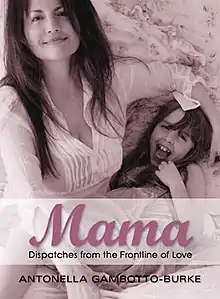 First edition | |
| Author | Antonella Gambotto-Burke |
|---|---|
| Cover artist | Kylie Mulquin (design) |
| Language | English |
| Genre | Parenthood, feminism, culture |
| Publisher | Arbon / Pinter & Martin UK |
Publication date | 15 April 2014 (Au/NZ); 2015 (World) |
| ISBN | 9780992351205 (first edition, paperback) |
| Preceded by | Mouth |
Mama: Dispatches from the Frontline of Love (ISBN 9780992351205) is Antonella Gambotto-Burke's first book about parenthood and sixth work. The foreword was written by French obstetrician and academic Michel Odent.[1] Dealing with the issue of attachment on levels ranging from the cultural to maternal-infant, Mama: Dispatches from the Frontline of Love features essays about Gambotto-Burke's experiences of motherhood and long-form interviews. Her interviewees include historian Stephanie Coontz,[2] artist Michael Hague, anthropologist Sheila Kitzinger, psychologist Gabor Maté, Michel Odent, and others. Mama was launched by internationally bestselling parenting author and psychology professor Steve Biddulph, who described the book's insights as "really important".[3] In an interview with the ABC, founder of the Read Clinic and widely published psychologist Dr. John Irvine[4] described Mama: Dispatches from the Frontline of Love as being to motherhood what The Female Eunuch was to feminism.[5]
Kelly Higgins-Devine[6] of the ABC joined the chorus of praise[7][8][9][10][11][12] for the book,[13] and in The Weekend Australian, reviewer Jack Marx described Mama as "anything but a book about a baby", and described it as "personal, magical, sublimely powerful, and medical jargon can take a hike. Gambotto-Burke’s point is that the shared experiences of mothers are of a value no PhD can match." He continued: "To suggest a patriarchal plot is not to be a fringe conspiracy theorist. In his 2012 book Sex and Punishment, Eric Berkowitz argued convincingly that ancient lawmakers, spooked by what they saw as the possibility of blokes becoming biologically redundant, had created a society that would condemn motherhood to little more than a masculine factory in which women laboured. This society exists today, motherhood still regarded as a temporary vocation for which one must seek 'leave', presumably from something more important than the raising of emotionally nourished human beings. Together, the voices in Mama push this same barrow, and it makes for an arresting argument."[14]
In an interview, Gambotto-Burke noted, "The kinds of pressures we exert [on children] are very different [to the Tiger Mother Syndrome] – expecting children to flourish without attention, punishing children for not complying, exposing children to all manner of unsuitable material and then bewailing their behavioural problems ... The greatest disservice parents do themselves and their children is living life at a crazy pace. We all need to slow down. We need to turn off our radios and televisions and PCs and just learn to be with our children. We need to listen to and take pleasure in them. Childhood is a garden, not a series of developmental stages."[15]
World English rights (excluding Australia/New Zealand) were picked up by Pinter and Martin in London. Mama will be published internationally in 2015.[16]
References
- ↑ Description and excerpt
- ↑ "Parenting: Stephanie Coontz on Motherhood," by Antonella Gambotto-Burke, The Herald, 2 August 2014
- ↑ Steve Biddulph and Antonella Gambotto-Burke launch Mama: Dispatches from the Frontline of Love Archived 29 April 2014 at the Wayback Machine
- ↑ Dr. John Irvine, Read Clinic profile Archived 29 April 2014 at the Wayback Machine
- ↑ "An Attached Approach to Parenting," Life Matters, ABC Radio National, 24 April 2014
- ↑ Kelly Higgins-Devine
- ↑ "Facing the onslaught of maternal intimacy," by Andie Fox, Daily Life, 5 June 2014
- ↑ "Writers in Paradise: Antonella Gambotto-Burke"
- ↑ "Surprise! Becoming a mother doesn't always destroy your life," produced by Annie Hastwell, The Wire, 29 May 2014
- ↑ Wake Up interview with Antonella Gambotto-Burke (Channel 10)
- ↑ Mornings interview with Antonella Gambotto-Burke (Channel 9)
- ↑ "Mama Mia!" by Helen Hawkes, Weekend Magazine, The Northern Star, 26 July 2014
- ↑ Kelly Higgins-Devine interview with Antonella Gambotto-Burke 27 June 2014
- ↑ "Dissident wisdom in Antonella Gambotto-Burke’s motherhood statement," by Jack Marx, The Weekend Australian, 9 August 2014
- ↑ "In support of mothers," by Helen Hawkes, Weekend Magazine, The Northern Star, 26 July 2014
- ↑ Pinter & Martin website